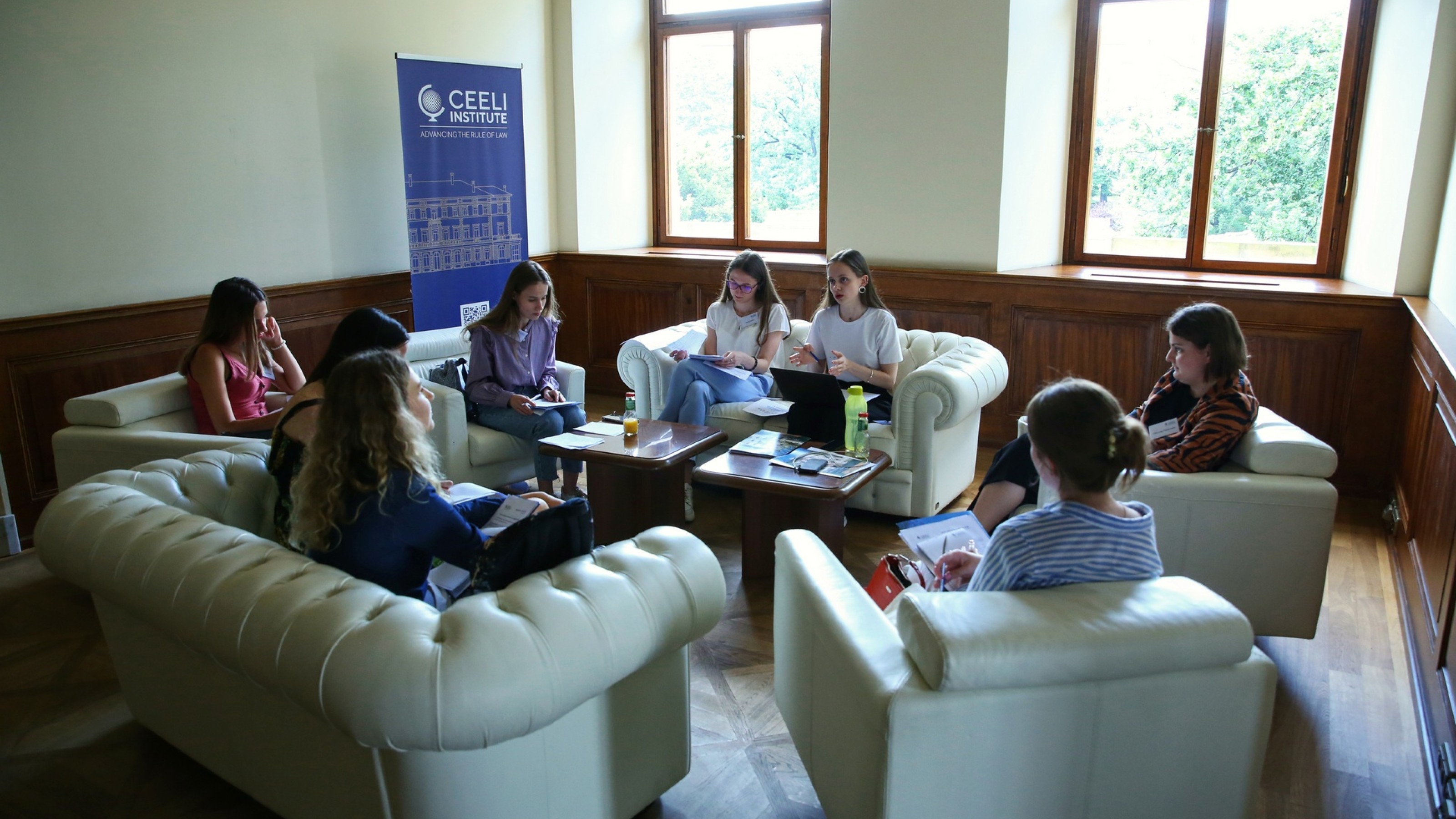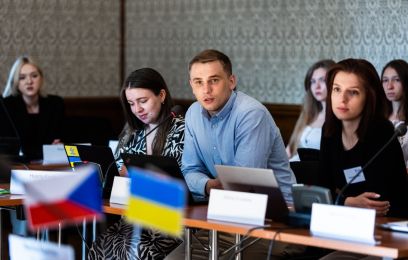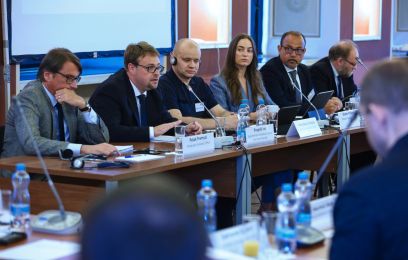
Before Russia’s full-scale invasion of Ukraine, Anna Bykova was like any other aspiring lawyer. “I lived an ordinary life; I was able to plan, dream, travel, and believe,” said Bykova, a law student at the National Academy of Internal Affairs in Kyiv.
Then, on February 24, 2022, everything changed. As bombs rained from Russian positions, Bykova, 25, took shelter in a basement, where she stayed for months.
Her initial focus was on survival. But soon, thoughts turned to the future—for herself, and for her country. “How can I help [Ukraine] as a lawyer?” Bykova wondered. “Is there any chance that we will be able to prosecute Russian soldiers and commanders [when the fighting is over]?”
In many parts of the world, legal education is often short on skills needed to take cases to court—such as interviewing clients, examining witnesses, and presenting arguments. For students and early-career lawyers, in Ukraine and elsewhere, obtaining these skills is typically done through trial and error.
Addressing these educational deficiencies was one of two goals of the CEELI Institute’s two-week summer school, “Legal Skills in a Time of War,” held in July for 32 Ukrainian law students and young professionals; Bykova was among them. Course concepts included the challenges and opportunities that international criminal law provides, and legal skills such as preparing traumatized witnesses for court. Mock trials were used to help students apply their new knowledge.
The Institute’s second goal was to introduce Ukrainian law students and young lawyers to international criminal law. “A common problem in international criminal law is that the word ‘genocide’ has different political and legal definitions, with the latter being narrower than the former,” said CEELI Institute Executive Director Julia Fromholz. “Victims of atrocities, survivors, and others often become attached to the word, and they might be gravely disappointed if a court were to decide that crimes against humanity were committed but genocide was not.”
“We wanted Ukrainian students to understand the differences between political and legal definitions and to recognize the full range of international crimes,” Fromholz said.
When the war is over, Ukraine’s lawyers will be essential for ensuring that justice is served. But even as the war rages on, Ukraine’s legal system continues to be a beacon of stability. Since the initial shock of the invasion, law firms across Ukraine have reopened, and lawyers are helping clients gather evidence that they’ll need to file claims for damage caused by Russian shelling.
“The young lawyers who took part in our training course are at the forefront of protecting the rule of law today, and will be long after the war ends,” said Fromholz.
For summer school participant Daria Rosokhata, 27, a doctoral student in law at Ivan Franko National University of Lviv, the war initially made her doubt the “effectiveness of international law and law in general.” But eventually, she found solidarity with other lawyers in Ukraine who were also “looking for ways to respond to the legal challenges” that Russia’s invasion has presented.
“The experience of participating in [the summer school’s] mock trials as a defender, following a procedure similar to the International Criminal Court, was particularly valuable,” said Rosokhata, who is also a legal specialist at the Ukrainian Women Lawyers Association. The experience helped her look at the crimes committed by Russia from the other side, which will strengthen her defense of Ukraine’s interests, she said.
Nadiia Vaskivska, 26, who recently graduated with a degree in law from the National University of Kyiv-Mohyla Academy, agrees. “During my bachelor’s and master’s degrees there was no possibility to listen to similar classes,” Vaskivska said. Now, she said, every Ukrainian lawyer needs to know how to prepare cases during conflict.
Trainers in the two-week course included judges, lawyers, and legal scholars from the Czech Republic, Estonia, Hungary, Ukraine, the United Kingdom, and the United States, all of whom donated their time. Marcia Levy, Director of Legal Residency at the University of New Hampshire Franklin Pierce School of Law in the U.S., and one of the summer school’s coordinators, said among the most important lessons she taught was how to interview clients with a “trauma informed lens.”
"We spent time teaching the impact of trauma on clients, and how [lawyers must] interview by being supportive, by being good listeners, but also understanding that neurologically, clients sometimes really can’t tell their story unless you work with them and are sensitive,” Levy said. “These students picked it up right away.”
For some students, studying with trainers who tried past war crimes – such as former Kosovo Specialist Chambers judges Andres Parmas, prosecutor general of Estonia, and Keith Raynor, a Crown Court judge in the UK (who is also a former prosecutor at the Extraordinary Chambers in the Courts of Cambodia) – was the main draw of the program.
“They are among the few people in the world who have real practice in this relevant field,” said Marta Bereza, 23, who is pursuing her master’s degree in law at Kyiv-Mohyla Academy. “We had the opportunity to practice in front of [these experts], who pointed out our strengths and weaknesses and provided constructive feedback,” Bereza said.
Diana Kubitska, 24, who recently received her degree in international law from Lviv National University, conceded that she wasn’t overly focused on the material before the course started. Rather, she just wanted to attend the summer school “to remember how to live in a peaceful world without air sirens and rocket attacks.” But the trainings and workshops, particularly those on “international criminal and humanitarian law,” she said, strengthened her legal expertise.
“The process of complex analysis of the practical aspects of cooperation between lawyers and people affected by the war, the way we were mastering the skills of legal rhetoric and legal psychology in the process of preparing for simulated court hearings, and [the] tribunals were perfectly organized,” Kubitska said.
Mariia Tsypiashchuk, a program lecturer and head of the Legal Clinic of the National University of Ostroh Academy in Ukraine, said that the summer school students will soon be dealing with the legal aftermath of war and need all the training they can get.
Previously, “not so many Ukrainian lawyers would have worked in international administration or international jurisdiction,” Tsypiashchuk said. Now they will be presenting cases in economic courts for reparations, and in other tribunals that present entirely new areas for most young lawyers, she said.
For Kataryna Bakai, a third-year law student at Kyiv-Mohyla Academy, the war has completely upended her professional outlook. Before February, corporate law was her calling. Today, it’s international criminal law. “I want to do something that will matter,” said Bakai, 20.
Tsypiashchuk said that is precisely why she was so honored to teach at CEELI Institute this summer. “What these students bring from here will help them extend not only their legal skills and expertise, but also their vision of what law is,” she said.
About the CEELI Institute Summer School
Between 4-15 July 2022, 32 Ukrainian law students and young lawyers selected from nearly 300 applications were in Prague for the inaugural “Legal Skills in a Time of War.” The course was made possible by generous funding support of CEELI Institute donors, led by Devon Energy, as well as the Fulbright Specialist Program and Widener University Delaware Law School.


